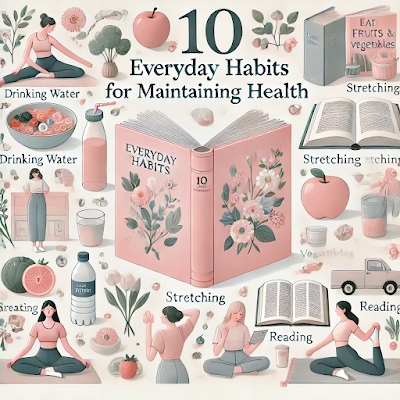In today’s fast-paced world, maintaining health can feel overwhelming, but integrating small, consistent habits into our daily routine can have a transformative impact on our well-being. These healthful practices are easy to incorporate, sustainable, and essential for long-term wellness. Let’s explore ten daily habits that support a healthier lifestyle.
Table of Contents
- Mindful Morning Hydration
- Stretching to Start the Day
- Prioritizing Balanced Nutrition
- Regular Physical Activity
- Mindfulness and Meditation
- Screen Time Management
- Getting Quality Sleep
- Maintaining Social Connections
- Practicing Gratitude
- Setting Personal Boundaries
1. Mindful Morning Hydration
Starting the day with a glass of water not only jump-starts metabolism but also helps to rehydrate the body after hours of rest. Consider adding lemon for an extra vitamin C boost.
Benefits:
- Enhances metabolism: Promotes energy and digestion throughout the day.
- Improves skin health: Replenishes cells, making the skin appear radiant.
To turn this into a habit, keep a glass or bottle of water by your bedside, or set a morning reminder to drink water before coffee or tea.
2. Stretching to Start the Day
A few minutes of morning stretching can improve flexibility, reduce muscle tension, and promote blood circulation. Regular stretching helps prevent injuries and enhances physical performance.
Benefits:
- Boosts circulation: Increases blood flow to muscles.
- Relieves tension: Especially beneficial if you have a desk job or use screens frequently.
Simple stretches like reaching for your toes, neck rolls, and shoulder stretches are easy to perform anywhere and require no special equipment.
3. Prioritizing Balanced Nutrition
A diet rich in whole foods—fruits, vegetables, lean proteins, and whole grains—supports all aspects of health. Aim for a colorful plate to ensure you’re getting a range of vitamins and minerals.
Benefits:
- Increases energy levels: Balanced meals sustain energy throughout the day.
- Supports mental clarity: Proper nutrition contributes to better cognitive function.
If meal prep seems daunting, start by adding one or two new vegetables each week or experimenting with nutrient-dense snacks like nuts, seeds, and yogurt.
4. Regular Physical Activity
Daily exercise, even if it's just a brisk 20-minute walk, enhances cardiovascular health, strengthens muscles, and boosts mood by releasing endorphins.
Benefits:
- Improves heart health: Reduces the risk of cardiovascular diseases.
- Supports mental well-being: Exercise can reduce symptoms of depression and anxiety.
For beginners, setting small goals like taking the stairs or choosing a parking spot farther away can help in forming a regular exercise habit without overwhelming commitment.
5. Mindfulness and Meditation
Taking a few minutes each day to practice mindfulness or meditation can reduce stress, improve focus, and promote emotional resilience. Even five minutes of deep breathing can make a difference.
Benefits:
- Reduces stress: Meditation helps in managing stress levels effectively.
- Increases focus: Mindfulness practices can improve attention span and memory.
To incorporate mindfulness, try guided meditation apps or simple deep-breathing exercises during a break or before bed.
6. Screen Time Management
Excessive screen time, especially before bed, can disrupt sleep patterns and strain the eyes. Limiting screen exposure during non-work hours improves sleep quality and reduces eye fatigue.
Benefits:
- Enhances sleep quality: Reduces blue light exposure, which impacts melatonin levels.
- Prevents eye strain: Minimizes digital eye strain symptoms like dry eyes and headaches.
Use settings like ‘Night Mode’ or take regular breaks by following the 20-20-20 rule: every 20 minutes, look at something 20 feet away for at least 20 seconds.
7. Getting Quality Sleep
Sleep is essential for physical and mental health, yet often neglected. Adults need 7-9 hours of quality sleep each night. Sleep routines, like consistent bedtimes and avoiding screens before bed, can support better sleep.
Benefits:
- Improves immunity: Quality sleep strengthens the immune system.
- Enhances memory and mood: Sleep helps process emotions and boosts cognitive function.
Create a relaxing pre-sleep ritual, such as reading, stretching, or listening to calm music, to signal your body that it’s time for rest.
8. Maintaining Social Connections
Healthy social relationships contribute significantly to mental health, providing support, encouragement, and a sense of belonging. Prioritize quality time with loved ones or make time to catch up with friends.
Benefits:
- Reduces stress: Social interactions can alleviate stress and improve mood.
- Increases longevity: Studies show strong social connections can contribute to a longer life.
Even if you’re busy, a quick call, a coffee date, or a shared activity can strengthen bonds and uplift spirits.
9. Practicing Gratitude
Expressing gratitude daily fosters a positive outlook and can improve overall mental health. Keep a gratitude journal, listing things you’re thankful for each day, no matter how small.
Benefits:
- Promotes positive mindset: Shifts focus from negative to positive.
- Reduces stress and anxiety: Studies suggest gratitude can lower cortisol levels.
This habit can be as simple as writing down three things you’re grateful for in a journal or saying them aloud each morning.
10. Setting Personal Boundaries
Personal boundaries are essential for maintaining mental and emotional well-being. Learning to say ‘no’ and protecting your time helps prevent burnout and creates space for self-care.
Benefits:
- Improves mental health: Boundaries prevent overwhelming commitments.
- Encourages self-respect: Prioritizing your needs can improve self-esteem.
Setting boundaries might include scheduling downtime, limiting work calls after hours, or politely declining invitations that feel overwhelming.
Conclusion
Integrating these ten habits into your daily life may take time, but each one is a small step toward long-term health and happiness. Start with one or two habits, then gradually build as they become part of your routine. Prioritizing these practices can help you lead a more balanced, energized, and fulfilling life.









0 Comments